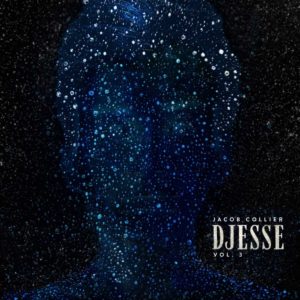Jacob Collier is a 24 year-old musical genius. He received widespread attention and acclaim in his late teens for his videos covering songs by artists such as Stevie Wonder and Jerome Kern. The talent displayed in the videos impressed one Quincy Jones so much that he offered to produce his debut album. Collier, flattered but nonetheless comfortable in his own methods and capabilities, instead asked if they can just be friends – which led to him signing to Jones’ management agency soon thereafter. In February 2017 he received two Grammys for arrangements of songs contained on his debut album, In My Room (2016). Now the exceptionally talented musician is poised to release his most ambitious work to date.
“Djesse is the culmination of a year of my life… I’ve been planning (it) for about two years,” Collier explains. This December 7 release represents volume one of four, with a combined 40 tracks expected to be released over the coming year – many featuring some of Collier’s personal heroes. “Really it’s one album but it’s four records. Each record has a completely different world, has a completely different flavour… I’ve been waiting my whole life to make this music. It’s the kind of music that started when I was one day old and it isn’t yet finished.”
Volume one opens with an ethereal, Haydn-esque choral arrangement in “Home Is”, performed by British a cappella octet Voces8. At 5:45 in length and with no lyrics sung until the 3:30 mark, it may strike first-time listeners as slightly disconcerting, however it does improve upon repeat listens as one becomes more acquainted with the composer’s use of silence and viscerally pleasing harmonic resolutions. What’s immediately clear here is that Collier is unafraid of taking bold risks and moving beyond styles and genres explored on his debut. In this way, indeed it could be argued that he’s adopting Herbie Hancock’s unrestrained approach to music making – no doubt informed and guided by discussions with the man himself.
“In my world, a box of stars, are you listening, can you hear,” Collier sings in vocoded harmony against the deep rumble of timpani at the start of “Overture” – in apparent reference to the star-studded cast he has assembled. A sprinkling of piano intervals introduce the Metropole Orkest, conducted by Jules Buckley. The grand arrangement takes on a warm, Christmas-like vibe with tubular bells and glockenspiel before hinting at what’s to come like a traditional musical overture. Here it may be worth noting that not only has Collier written the orchestral arrangement, he has also engineered, produced and mixed it – no mean feat, especially considering he elected to mike up every single orchestral performer in addition to using room microphones. To get it sounding right is an arduous task so great it’s enough to make you feel exhausted just thinking about it.
“Overture” ends on the same suspended chord that opens first single, “With The Love In My Heart”. The two tracks are bridged via the use of a slowing down and speeding up effect provided in the maestro’s preferred digital audio workstation, Logic. “With The Love In My Heart” is an upbeat number in five sections. Collier calls the first of these sections “orchestra glow”, and to further illustrate how mind-bogglingly challenging the task of mixing this album is, he explains, “there are two other Logic sessions that have contributed to this (song), which combined contain 360 tracks as well. So there’s actually 720 tracks in this session. Which is ridiculous. It’s just crazy.”
Collier’s mother Suzie and his two sisters provide unison vocals to accompany his lead, with syncopated drums playing seven beats per bar entering soon thereafter to lead us into the second section, which Collier has labelled “funky verse”. A plethora of parts performed by the multi-instrumentalist are also backed by the full orchestra and inaudible samples of ocean and rain, “to add air”. The third section, driven by light, funky guitars, bass and electric keyboard, contains whoops and call-outs from a chorus of friends including guitarist Steve Vai. This all soon gives way to a Prince-like, heavy, synth-driven funk. Next, blink and you’ll miss it, as the orchestra takes over for a run of arpeggios. Finally, the listener is carried out by a soothing solo vocal section which ultimately feels unnecessary – like a cherry on top of an already indulgent parfait.
The next six tracks were performed live at Collier’s BBC Proms concert in July. “Ocean Wide, Canyon Deep”, a duet with Laura Mvula, opens and closes with a chord organ, recalling the intro to “Memory Of A Free Festival” by David Bowie. The orchestra here seemingly accounts for most of the instrumentation, with a simple double bass line keeping steady pace. The harmonies and rises and falls are both lush and elegant, however the track won’t take listeners to the dizzying highs of marvelment afforded by preceding tracks and indeed his debut record.
The title track “Djesse” comes next, pronounced with a silent D so that it sounds similar to the initials JC. It’s unashamedly self-referential, as Collier sings to himself, “you’ve been silent for your whole, whole life, how I wish I knew the world burning in your heart… Oh Djesse, set me free… be who you wanna be”. The jovial, carefree arrangement serves as a reminder that even the most seemingly straightforward passages to come from Collier’s mind are wildly unpredictable – a deviating note here or there, or evolving rhythms and beats to keep listeners engaged and on their toes.
“Everlasting Motion” is a standout track featuring Moroccan singer Hamid El Kasri and displaying a distinctly African flavour. Its syncopated percussion at the start is reminiscent of “Saviour” from In My Room, whilst a captivating bassline recalls a vocal melody from “Walking Through The Ruins” by Split Enz. The track speeds up in its outro, as the orchestra builds to a crescendo.
An upbeat cover of The Police comes next in “Every Little Thing She Does Is Magic”. For the most part, it’s surprisingly recognisable and perhaps even a little unadventurous, with the obvious exception of orchestral flourishes. The outro however, provides some much needed Collier ‘magic’ – and even some bubbles for good measure.
“Once You” is a lengthy but nonetheless impressive and touching piece, featuring Collier’s mother Suzie on violin and recalling classic songs such as Bernstein/Sondheim’s “Somewhere” from the musical West Side Story. It likely won’t appeal to many fans, but it shows that Collier could make a move into composing for films, should he wish to and if the price is right. Astonishingly, with two Grammys already to his name, we could be witnessing the career birth of a future EGOT winner.
A cover of Lionel Richie’s “All Night Long”, featuring American a cappella sextet Take 6, rounds out volume one and provides another definite highlight. As he did in The Police cover earlier, Collier finds an unusual way to modulate to a brighter key about halfway through. The vocal harmonies performed in this modulating section and indeed a few moments later are quite spectacular. Jazzy saxophone runs interrupt an all-out party atmosphere by this stage, as Collier finally hits the piano to perform a face-melting and long-awaited solo – at one point performing the same frenetic descending line in unison on electric bass. It’s some of the best music you’ll hear all year. There’s so much going on at this point that you may even miss The Jackson 5 reference, “A-B-C, 1-2-3”.
Written and recorded entirely within 2018 and by the sounds of it, written mostly in transit to various locations scattered around the world, Djesse Vol. 1 represents Collier’s willingness and desire to step out of his comfort zone to try new ideas, explore new genres and collaborate with interesting artists. His expanded universe of “different worlds” welcomes in warm, relaxing and challenging fashion, with so much on offer it’ll take several listens just to gain your bearings. While the obvious criticism here could be that the tracks are overproduced and too eclectic in style, Collier should instead be commended for taking a risk and pushing boundaries to the point of near collapse.
Djesse Vol. 1 is released Friday 7th December via Hajanga Records/Geffen Records/Decca.



